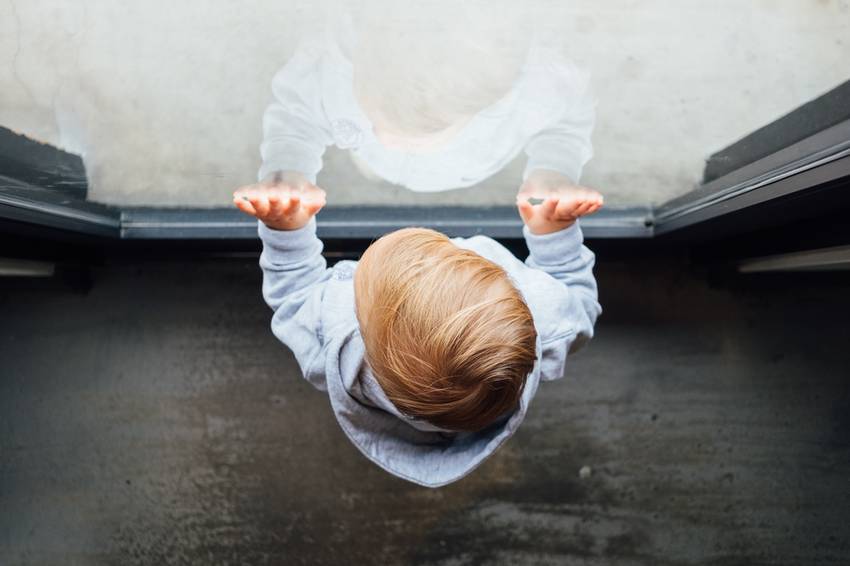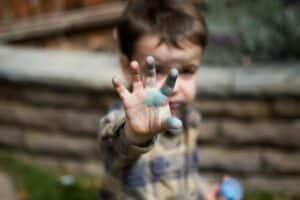Do you ever feel like your young child is constantly attacking you? It feels like they are constantly screaming, hitting, and biting. You may be wondering why is my toddler so mean to me. Every child is different, and each will exhibit different behaviors. However, there are a few things that you can do to help reduce the amount of aggression that your child displays towards you.
Why is my toddler so mean to me?
Your toddler has not quite been there yet to have learned to express their anger, frustrations & disagreements in a positive manner. You can help them learn by setting up clear house rules and explaining the rules to them. Positive reinforcement is a go-to. Teach them empathy by being empathetic and patient.
In this blog post, we will discuss why toddlers can be mean to their parents and provide some tips on how to handle these situations.

What Factors Contribute To Toddler Aggressiveness?
Ever ask yourself why your child lashes out with biting, kicking, or hitting? More often than not, it’s because they’re tired, hungry, or have a vocabulary too limited to express themselves.
When frustration and anger build up inside them, instead of using their words as we adults do, they resort to using their bodies as outlets.
When toddlers are tired or hungry, they can become extremely cranky and difficult to deal with. Every object is “theirs”.
How To Curb Your Toddler’s Aggressive Outbursts?
As a parent, you may sometimes wonder why is my toddler so mean to me. However, under such circumstances, it is important to try and stay calm. If you have a toddler that tends to act out aggressively, here are some tips to help:
- Keep your cool. If you’re overreacting and dramatic, she’ll remember “punching” as a surefire way to get a lot of attention the next time.
- Spanking, chastising severely or vociferously, and shouting are all discouraged by the American Academy of Pediatrics (AAP) for toddlers who are acting violently. The ideal reaction is a simple one. Say, “We don’t hit. Hitting causes pain to people.” She probably won’t comprehend a punishment like a time-out at this age, but you can be sure that an easy, calm response will result in significantly better results than a red-hot one.
- Repeat the rules every time your child breaks one – eventually, they will learn.
- Encourage non-violent play. Keep an eye out for methods by that violence might seep into your child’s play. When your toddler starts to make his doll hit other dolls, he’s one step away from performing the act in real life. Intervene when you see your kid engaging in violent behavior and explain, “It’s not nice to make Dora strike Elmo.
- Reduce the chance of violence. Try to keep her away from toy weapons; tv broadcasts about shootings and older siblings’ ill-advised video games.
- Know what sets your toddler off. A toddler’s irritation is caused by various things, including tiredness, hunger, overstimulation, and anxiety. Pay attention to these signals so you can be ready for aggressive behavior.
- Help your toddler manage their anger in a socially acceptable way by giving them an outlet to express themselves. Saying this will help teach your child what is and isn’t acceptable behavior while also helping them feel heard and understood.
- Allow for time. It’s not true that your youngster will become a bully because they throw a tantrum physically. With maturity, you’ll have empathy, and soon your kid will realize that harming others with force is not okay.
- If you get upset and start yelling whenever something bothers you, your toddler will think it’s normal to behave the same way. Toddlers often copy what they see adults do, so it’s important to show them how to stay calm in difficult situations.
- Give Your Toddler Additional Attention. It does not necessitate giving your toddler more attention than anybody else that you spend extra time with them.
Though we can’t be attentive to everyone equally at all times, sometimes, when we spend a lot of time with someone, familiarity breeds contempt, and we begin prioritizing quantity over quality – which is never good.
These are the times when you’ll think, why is my toddler so mean to me? Ways to connect with your kid can be as simple as chatting over lunch or playing together. For instance, if they’re contentedly drawing, take a few minutes to join in instead of rushing off to finish a task.

How To Deal With Toddler Aggression In Playgroups?
Though it’s not fun to think about, toddler playdates can include biting, shoving, and hitting. And what’s worse, your little one might start copying these aggressive behaviours from the other children.
To prevent this behavior, create a code of conduct and be consistent. If your youngster sees other kids hitting or kicking someone at the playgroup, comment like, “We do not hit. Hitting is unpleasant.” When your toddler is enraged, always validate her feelings.
Above all, make sure somebody is always watching over your kid during playgroup. If your little one gets into a tiff with another toddler, don’t jump in right away (kids need to understand how social relationships work, which gives them practice resolving disputes), but do step in if matters become physical.
If another kid strikes your child, or if he is the aggressor, first try to soothe the injured. Then, in a calm but firm tone, explain that hitting and kicking are not permitted and that you will terminate the game session if this behavior persists. Finally, engage both youngsters in an enjoyable activity to divert their attention.
When Should You Be Concerned?
Although most children outgrow aggression, here are some warning signs that indicate when you should contact a child development specialist:
- Persistent aggressive child behavior lasting more than a few weeks.
- It can be tough handling your child and the situation when meltdowns occur.
- If you or another adult are physically harmed, they may remove your child from preschool, playgroups, or other neighborhood settings.
- Fear that your child will be harmed or harassed by others
Consistent boundaries from the beginning are key to improving aggressive behavior from toddlers.
Frequently Asked Questions
Q1: Why is my toddler so aggressive when interacting with me?
Ans: Your toddler’s aggressive behavior when around other children, such as hitting, shoving, or biting, is a way for her to express frustration and learn self-control.
Q2: What is the average amount of aggression seen in toddlers?
Ans: Aggression is typical in toddlers as they learn socially and emotionally. When children are overwhelmed by strong feelings, they hit, kick, and scream. Toddlers frequently bite for the same reason.
Q3: What is the reason for my child’s temper and aggressiveness?
Ans: ADHD, autism, obsessive-compulsive disorder, and Tourette’s syndrome are all linked to anger problems in kids.
Q4: Why is my 2-year-old so mean to me?
Ans: There are several reasons, including that your child is learning to communicate and express emotions. Additionally, toddlerhood is a time of great change and transition, which can be overwhelming for some children.
Q5: What should I do about my 4-year-old aggressive toddler?
Ans: The beginning of your journey should be to discover what is causing your child’s aggression. Once you’ve identified the source of the problem, you can begin working on a solution. Several books and articles may assist you with this issue. You might also consider seeking professional help.
Conclusion
Have you been wondering why is my toddler so mean to me? Toddlerhood is a time of great change and transition, which can be overwhelming for some children. If you are concerned about your child’s behavior, it is important to start by trying to understand the root of the problem. Once you know what is causing the problem, you can begin to work on a solution for good behavior.







